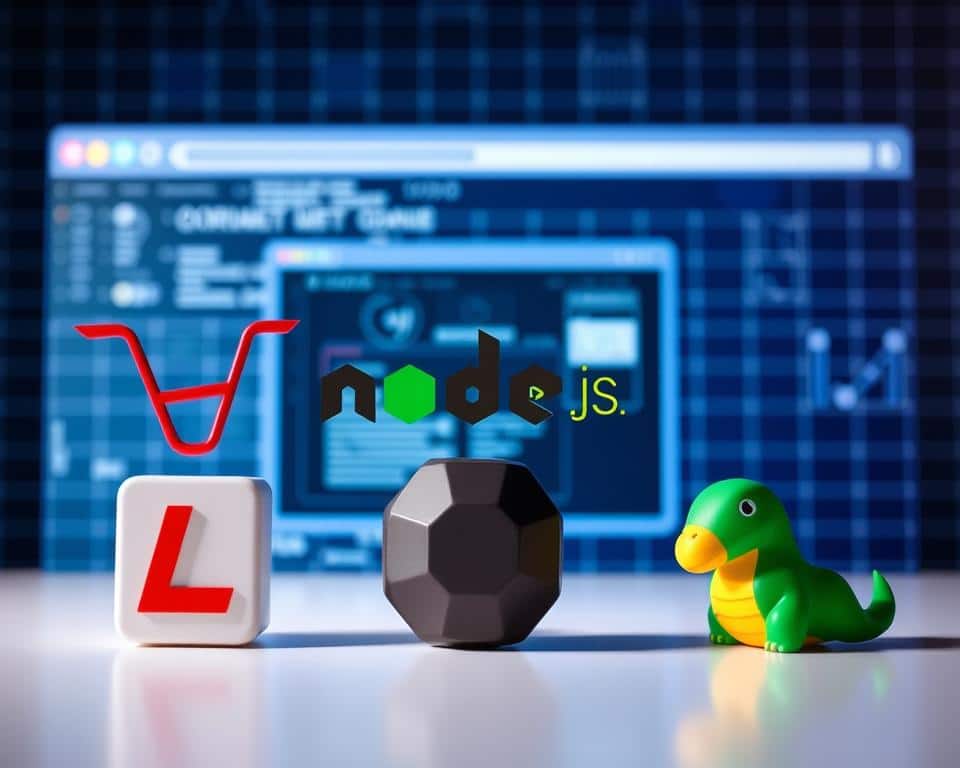Choosing the right framework is key when making a web app. There are many options, and developers need to think carefully. They must pick the best one for their project.
The debate between Laravel, Node.js, and Django is ongoing. Each has its own strengths and weaknesses. Laravel is known for its strong security. Node.js is great for handling real-time data. Django is a high-level framework for quick development.
It’s important to know the differences between these frameworks. This helps make a smart choice. Things like project needs, team skills, and how much it can grow are important.
Table of Contents
Key Takeaways
- Choosing the right framework is crucial for web application development.
- Laravel, Node.js, and Django are popular frameworks with different strengths.
- Project requirements and team expertise influence framework selection.
- Scalability needs should be considered when selecting a framework.
- Understanding the differences between frameworks is essential.
Understanding Web Development Frameworks and Technologies
Modern web development uses frameworks to make the process easier and improve app performance. These frameworks give a structured way to build web apps. They offer tools and libraries that make development smoother.
The Role of Frameworks in Modern Web Development
Frameworks are key in web development. They help build strong, scalable, and easy-to-maintain apps. They provide pre-built components and tools, letting developers focus on the app’s core.
Server-Side vs Full-Stack Solutions
The choice between server-side and full-stack frameworks depends on the project. Server-side frameworks like Laravel and Django handle backend tasks. Full-stack solutions, like Node.js, support both frontend and backend.
The Importance of Choosing the Right Technology
Picking the right technology is vital for a web app’s success. Consider scalability, performance, and development speed. For example, Laravel, Node.js, and Django have different strengths, as shown in the table below.
| Framework | Scalability | Performance | Development Speed |
|---|---|---|---|
| Laravel | High | Good | Fast |
| Node.js | High | Excellent | Rapid |
| Django | High | Good | Fast |

Laravel vs Node.js vs Django – Which is Best for Your Web App?
Choosing the right framework for your web app means knowing the good and bad of Laravel, Node.js, and Django. Each has its own special features, benefits, and when to use them.
Key Differences at a Glance
Laravel, Node.js, and Django are quite different in how they work, their coding style, and what they’re good for. Laravel is a PHP framework known for its clean code and strong features for web apps. Node.js is a JavaScript environment for making fast and scalable apps. Django is a Python framework that’s all about quick development and simple design.
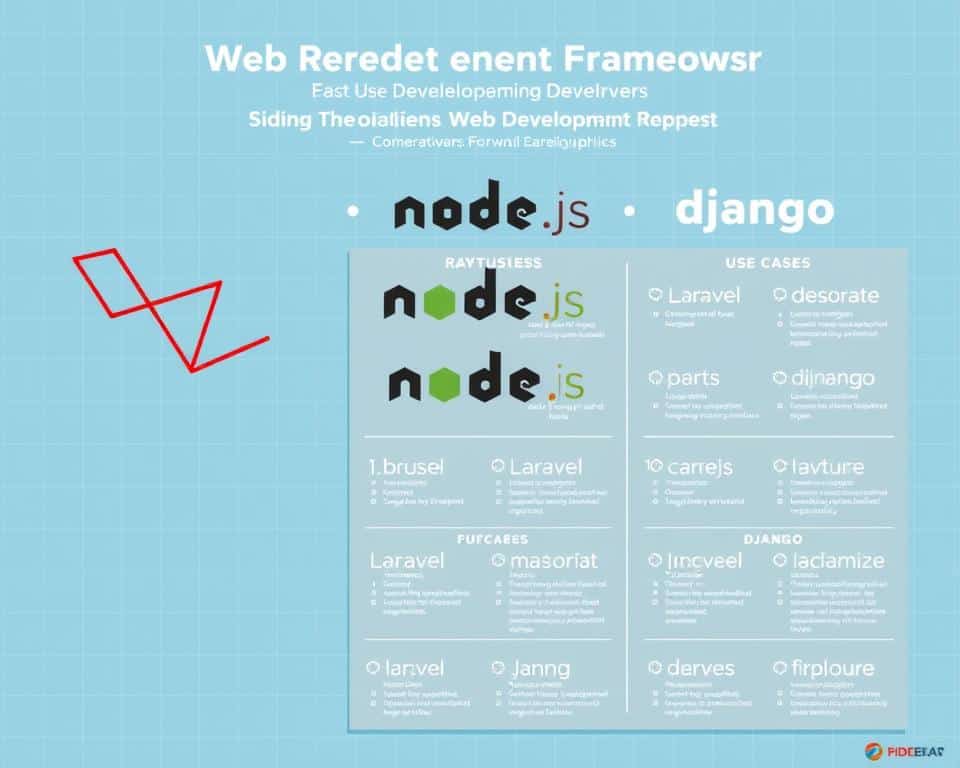
Matching Technologies to Project Requirements
Choosing between Laravel, Node.js, and Django depends on your project’s needs. For example, if you’re making a big web app with lots of integrations, Laravel’s big ecosystem might help. For apps that need to update fast, Node.js is a good choice because it handles data well. Django is best for quick projects with complex data.
Decision Framework for Technology Selection
To pick the right tech, think about these things:
- How complex and big your project will be
- What your team knows and likes
- How you’ll connect with other services
- How fast and secure your app needs to be
Looking at these points and what each framework does well will help you pick the best tech for your web app.
Laravel: The PHP Powerhouse
Laravel is a free, open-source PHP framework for web app development. It follows the model–view–controller (MVC) pattern. Since its start in 2011, it has changed PHP development for the better. Laravel’s popularity comes from its many features, like a strong routing system and an ORM called Eloquent. It also has a templating engine named Blade.
Core Features and Architecture
Laravel makes web development easier with its core features. Its architecture is built around the MVC pattern. This keeps logic and presentation separate. It has Eloquent, a powerful ORM, and Blade, a templating engine for clean code.
The Laravel Ecosystem
The Laravel ecosystem is huge, with many tools and packages. Laravel Forge and Laravel Vapor help with deployment and scaling.
Blade Templating and Eloquent ORM
Blade is Laravel’s templating engine. It helps keep presentation logic separate from application logic. Eloquent ORM makes database interactions simple and elegant.

Laravel can be made even better with packages. These packages add features like authentication systems and payment gateways. They boost Laravel’s capabilities.
Node.js: JavaScript Everywhere
Node.js changed web development by using JavaScript for both client and server sides. This makes development faster and opens up new possibilities for real-time web apps.

Runtime Environment vs Traditional Framework
Node.js is different from traditional frameworks because it’s built on Chrome’s V8 JavaScript engine. This lets Node.js run JavaScript on the server side. It’s great for full-stack development because it’s fast and scalable.
The Node.js Ecosystem and Popular Frameworks
The Node.js ecosystem is huge, with many libraries and frameworks that make development easier. Express.js and Nest.js are two popular choices for web app development.
Express.js, Nest.js, and Other Frameworks
Express.js is known for being simple and flexible. It lets developers organize their code however they want. Nest.js, with its TypeScript, is good for complex, big projects. Other frameworks like Koa.js and Hapi also add to Node.js’s richness.
NPM and Package Management
NPM (Node Package Manager) is a big part of the Node.js ecosystem. It helps install and manage dependencies. With NPM, developers can add third-party libraries easily, making projects better and faster.
Django: Python’s Web Framework Giant
Django is a top Python web framework that helps you build websites fast and clean. It’s free and open-source. Developers can make complex, data-driven sites quickly and well.
Core Features and Architecture
Django’s design is all about being modular and reusable. It follows the “don’t repeat yourself” (DRY) rule. It has an ORM system, templates, authentication, and a strong admin interface.
Django’s ORM system lets you work with databases using Python, not SQL.
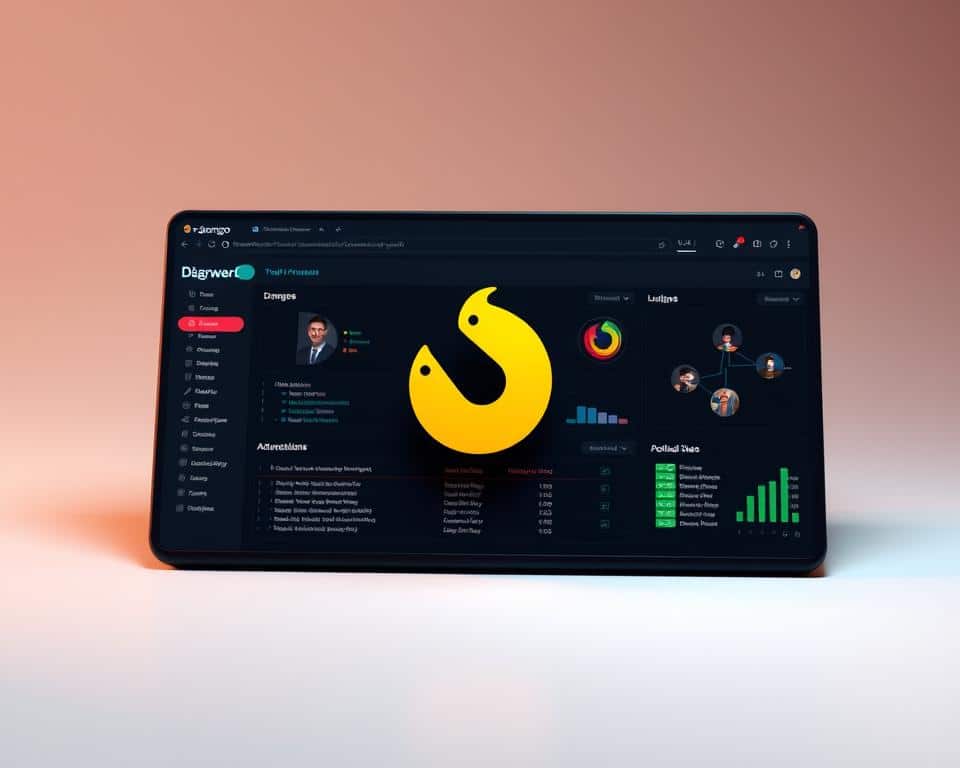
The Django Ecosystem
The Django world is huge and varied, with lots of third-party packages and tools. This shows Django’s flexibility and the community’s creativity.
Django’s “Batteries Included” Philosophy
Django comes with many built-in features ready to use. This includes an authentication system and an admin interface. Django’s creator says, “Django is a high-level Python Web framework that encourages rapid development and clean, pragmatic design.”
“Django is a high-level Python Web framework that encourages rapid development and clean, pragmatic design.”
Django REST Framework and Extensions
For making RESTful APIs, Django REST Framework is a top pick. It makes building RESTful APIs easy and flexible. The Django world also has many extensions, like Django Channels for real-time features.
In summary, Django is a strong choice for web development. It supports fast development and is scalable and secure.
Performance Comparison
Performance is key in web development. Comparing Laravel, Node.js, and Django helps developers choose wisely.
Request Handling and Response Times
How fast a framework handles requests matters a lot. Laravel is known for its quick responses. Node.js is fast because it handles many requests at once. Django is also quick, focusing on performance.
| Framework | Request Handling Mechanism | Average Response Time |
|---|---|---|
| Laravel | Synchronous with Queue Support | ~50ms |
| Node.js | Asynchronous | ~20ms |
| Django | Synchronous | ~30ms |
Scalability Under Load
Scalability is crucial for apps with lots of users. Node.js excels at handling many connections at once. Django also scales well with load balancing and caching. Laravel can scale, but needs more setup.
Memory Usage and Efficiency
Memory use is important too. Node.js uses less memory than others, thanks to its small footprint. Django and Laravel use more, but can be optimized.
Benchmarking Results and Analysis
Benchmarking shows how frameworks perform under different loads. Node.js leads in requests per second. But Laravel and Django do well in specific situations.
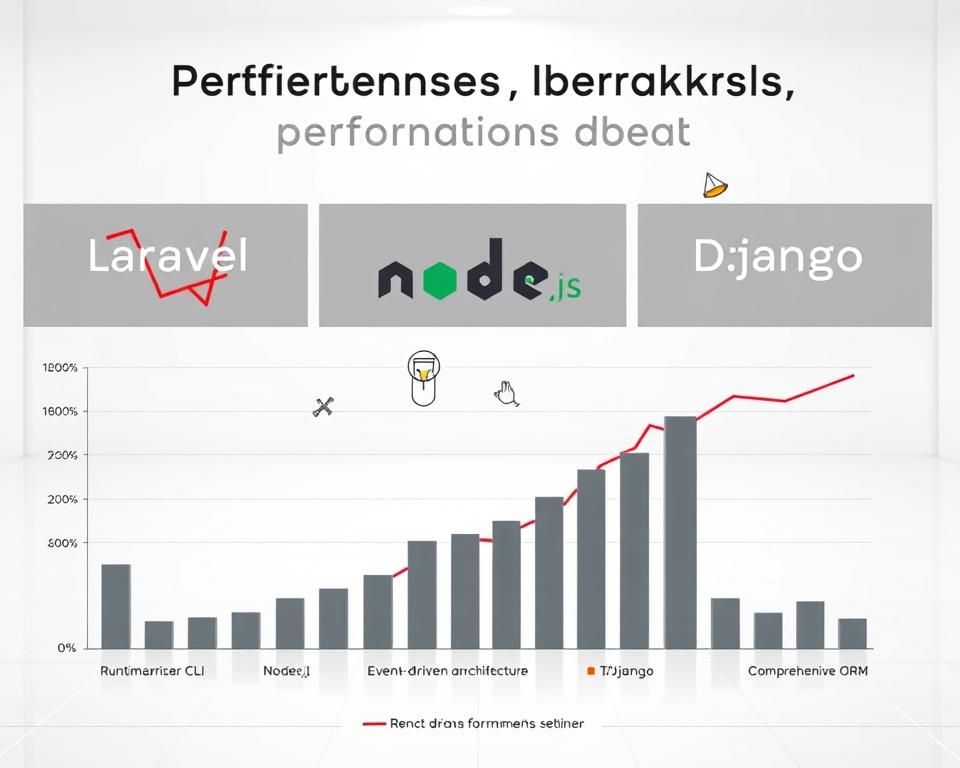
Scalability for Different Application Types
Different web applications need different levels of scalability. The framework you choose can greatly affect how well your app performs. Scalability depends on the app’s type, expected traffic, and service complexity.
Handling High-Traffic Applications
High-traffic apps need frameworks that can handle lots of requests at once. Laravel is great for this with its strong queueing system and load balancing support. Node.js is also good because it’s designed to handle many requests without slowing down.
Django isn’t as naturally scalable as Node.js. But it can still grow with its modular design and support for distributed databases.
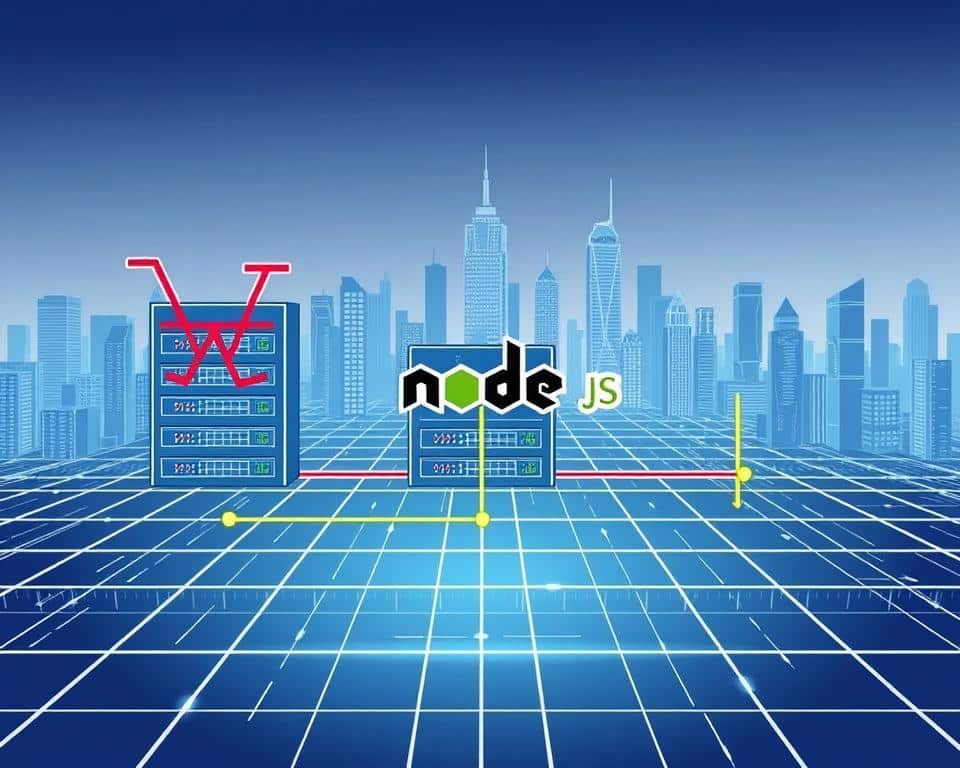
Microservices Architecture Support
Microservices are popular for complex apps. Node.js is perfect for microservices because it’s light and easy to split into services. Laravel and Django also support microservices, but need more setup.
The secret to microservices is scaling each part on its own. All three frameworks can do this with the right setup.
Real-time Applications and WebSockets
Real-time apps need WebSockets for constant communication. Node.js is great at this with libraries like Socket.IO. It’s event-driven, making it perfect for real-time needs.
Laravel and Django also support WebSockets with extra libraries. They’re good choices for apps that need to update in real-time.
Learning Curve and Developer Experience
Choosing a web development framework like Laravel, Node.js, or Django depends on the learning curve and developer experience. It’s important for developers and teams to understand these factors. This helps them decide which technology is best for their projects.
Required Skills for Each Technology
Each framework needs specific skills. Laravel requires knowledge of PHP and its ecosystem. You need to know PHP 7.x and Laravel’s Eloquent ORM well.
Node.js demands JavaScript skills, understanding of asynchronous programming, and knowledge of modules like Express.js. Django needs Python knowledge, along with understanding Django’s ORM and templating engine.
A comparison of the required skills can be seen in the following table:
| Framework | Primary Language | Key Skills |
|---|---|---|
| Laravel | PHP | PHP 7.x, Eloquent ORM |
| Node.js | JavaScript | Asynchronous programming, Express.js |
| Django | Python | Django ORM, Templating engine |
Documentation and Community Support
Good documentation and community support are crucial for a smooth developer experience. Laravel has detailed documentation and a large community. Resources like Laracon and Laravel.io are available. For more information, visit Next Big Technology.
Node.js also has comprehensive documentation and a vast ecosystem. It has many packages available via npm. Django provides detailed documentation and has an active community. Resources like Django Girls and DjangoCon are available.

Development Speed and Productivity
The development speed and productivity of each framework are important. Laravel is known for its rapid development capabilities. Its Eloquent ORM and Blade templating engine help a lot.
Node.js enables fast development with its non-blocking I/O model and extensive npm ecosystem. Django also supports rapid development. Its batteries-included approach and reusable components help a lot.
In conclusion, when evaluating the learning curve and developer experience, consider the required skills, documentation, community support, and development speed. This helps developers make informed decisions that fit their project needs and team capabilities.
Database Integration and ORM Capabilities
The success of a web app often depends on its database integration and ORM capabilities. A good database layer boosts app performance, scalability, and upkeep.
Laravel’s Eloquent ORM
Laravel’s Eloquent ORM is a simple, elegant way to work with databases. It supports MySQL, PostgreSQL, and SQLite. Its key features are:
- Easy and clear syntax for database tasks
- Support for complex queries and relationships
- Eager loading to cut down on query overhead
Node.js Database Options
Node.js doesn’t have a built-in ORM. But, it has many database options through libraries and frameworks. Some top picks are:
- Sequelize: A promise-based ORM for multiple databases
- TypeORM: A TypeScript ORM with lots of flexibility
- Mongoose: A MongoDB ORM with rich features for NoSQL
For more on back-end web development languages, check out Next Big Technology.
Django’s ORM System
Django has a built-in ORM system. It lets developers use Python code instead of raw SQL. Django’s ORM is known for:
- High-level abstraction for more Pythonic database work
- Support for complex queries and database migrations
SQL vs NoSQL Support
All three frameworks support SQL and NoSQL databases. Laravel and Django are strong with SQL. Node.js works with both SQL and NoSQL through different libraries.

Security Features and Best Practices
Web development needs a secure application, and popular frameworks help. Laravel, Node.js, and Django protect against threats with built-in features. They offer strong defenses against common vulnerabilities.
Built-in Security Mechanisms
Laravel, Node.js, and Django have many security features. Laravel has CSRF protection and secure password hashing. Node.js uses Express.js for security headers.
Django has a wide security framework. It guards against SQL injection, XSS, and CSRF. For example, Laravel’s authentication secures user data. Django’s ORM system fights SQL injection by cleaning inputs.
Common Vulnerabilities and Protections
SQL injection, XSS, and CSRF are common threats. Laravel and Django protect against these with their ORM systems and templating engines. Node.js uses Helmet to set security HTTP headers.
The table below compares how these frameworks handle vulnerabilities:
| Vulnerability | Laravel | Node.js | Django |
|---|---|---|---|
| SQL Injection | Eloquent ORM protects against SQL injection | Parameterized queries prevent SQL injection | ORM system sanitizes inputs |
| XSS | Blade templating engine provides XSS protection | Use libraries like DOMPurify | Template engine auto-escapes variables |
| CSRF | CSRF tokens are automatically generated | Use middleware like csurf | CSRF tokens are used in forms |
Security Maintenance and Updates
Keeping web applications secure requires regular updates. Laravel and Django have strong update systems. Laravel gets automatic security updates, and Django’s team quickly fixes vulnerabilities.
Authentication and Authorization Implementations
Strong authentication and authorization are key. Laravel has a full authentication system, including password reset and email verification. Django also has a solid system that can be extended. Node.js uses Passport.js for authentication.
For more on secure authentication, check out Laravel development companies. They have integrated strong security into their apps.
Deployment and DevOps Considerations
The deployment phase is key in web development. Knowing how to deploy Laravel, Node.js, and Django is crucial. Good deployment strategies boost app performance, scalability, and reliability.
Hosting Requirements
Laravel needs a traditional web server like Apache or Nginx. Node.js can run on many platforms, including cloud services. Django, a Python framework, can be hosted on servers or in the cloud.
Containerization and Cloud Deployment
Docker containerization is popular for web app deployment. All three frameworks can be containerized. This makes cloud deployment on AWS, Google Cloud, or Azure easier. Cloud deployment brings scalability and flexibility.
CI/CD Pipeline Integration
CI/CD pipelines are vital for modern web development. Laravel, Node.js, and Django work with tools like Jenkins and GitLab CI/CD. This setup automates testing and deployment, cutting down on errors and speeding up development.
Serverless Deployment Options
Serverless deployment is a modern choice for web apps. Node.js fits well with serverless, thanks to AWS Lambda. Laravel and Django can also go serverless, but need extra setup. Serverless cuts costs and boosts scalability.
Integration Capabilities
Choosing the right web framework is key. It involves looking at its API development and third-party service integration. A good framework should work well with other technologies and services. This is important for creating strong and growing web applications.
API Development and Consumption
Laravel, Node.js, and Django are all great for API development. Laravel has tools like Laravel Passport for OAuth. Node.js frameworks, like Express.js, make it easy to build APIs. Django has Django REST framework for creating Web APIs.
- Laravel: Makes API development simple with built-in support for API routing and middleware.
- Node.js: Offers flexibility with many libraries for API development.
- Django: Has a mature REST framework for building strong APIs.
Third-party Service Integration
Integrating with third-party services is crucial for web apps. Laravel and Django make it easy with their packages and libraries. Node.js benefits from the huge npm ecosystem, making service integration simple.
Frontend Framework Compatibility
It’s important for a backend framework to work well with frontend frameworks. Laravel, Node.js, and Django all play nicely with React, Angular, and Vue.js.
In summary, Laravel, Node.js, and Django are all good choices for complex web apps. Your project’s specific needs will guide your decision.
Real-World Use Cases and Success Stories
Laravel, Node.js, and Django are changing the game in web development. They help businesses grow and innovate. These frameworks power many successful web apps in different fields.
Laravel in Production
Laravel is used in many real-world apps, like e-commerce sites and content management systems. Invoice Ninja, a top invoicing tool, uses Laravel. Its strong features and growth potential win over developers and companies.
“Laravel has been a game-changer for our business, allowing us to rapidly develop and deploy new features.” –
Node.js Success Stories
Node.js leads in making web apps live in real-time. Big names like PayPal and Netflix use it. PayPal saw big boosts in speed and cut down on development time with Node.js.
Django Powered Applications
Django is behind some of the biggest and most data-heavy apps, like Instagram and Pinterest. It’s great at handling lots of traffic and data. This makes it a top pick for big projects.
Industry-Specific Applications
These frameworks are used in many areas, from finance and healthcare to e-commerce and entertainment. For example, Django helps manage patient data in healthcare. Laravel is key in e-commerce for building strong online stores.
The success of these frameworks shows their flexibility and value in web development. Choosing the right one ensures web apps are scalable, secure, and meet specific needs.
Making the Final Decision: Framework Selection Guide
Choosing the right framework for your web app is key to success. You need to think about several important factors.
Project Type Considerations
The project type is crucial in picking a framework. For example, a data-heavy app might need Django for its ORM and abstraction. On the other hand, Node.js is better for real-time apps due to its event-driven model.
- For complex, data-driven applications, consider frameworks with strong ORM capabilities.
- For real-time applications, look into frameworks that support WebSockets and event-driven programming.
Team Expertise and Learning Resources
Your team’s skills and the framework’s learning curve matter a lot. If your team knows JavaScript, Node.js could be easier and cheaper. If they’re more into PHP, Laravel might be better.
A leading web development company says, “Choose a framework that fits your team’s skills to boost productivity and cut learning time.” Top web development companies stress the importance of matching the technology stack to the team’s expertise.
Budget and Timeline Factors
Budget and timeline are big in choosing a framework. Some frameworks need more resources or have specific hosting needs that can affect your budget. For example, a scalable project might need a cloud-based solution.
Short-term vs Long-term Considerations
Think about both short-term and long-term goals when picking a framework. A framework might be quick to develop but consider its scalability and maintainability over time.
- Evaluate the framework’s performance under expected loads.
- Consider the framework’s support for scalability and potential for growth.
- Assess the total cost of ownership, including development, maintenance, and potential scaling costs.
The best framework balances your immediate needs with your long-term vision. By considering project type, team expertise, budget, timeline, and short-term vs long-term goals, you can make a smart choice for your project’s success.
Conclusion
After looking at Laravel, Node.js, and Django, we see each has its own strengths and weaknesses. The right choice depends on what your project needs, your team’s skills, and how big you want it to grow.
Laravel shines in PHP projects, with a strong ecosystem and Eloquent ORM. Node.js is great for JavaScript, making real-time apps and microservices easy. Django, built on Python, focuses on quick development and security.
Choosing the right framework is key for a web project’s success. Knowing what each framework offers helps developers pick the best one for their goals.







